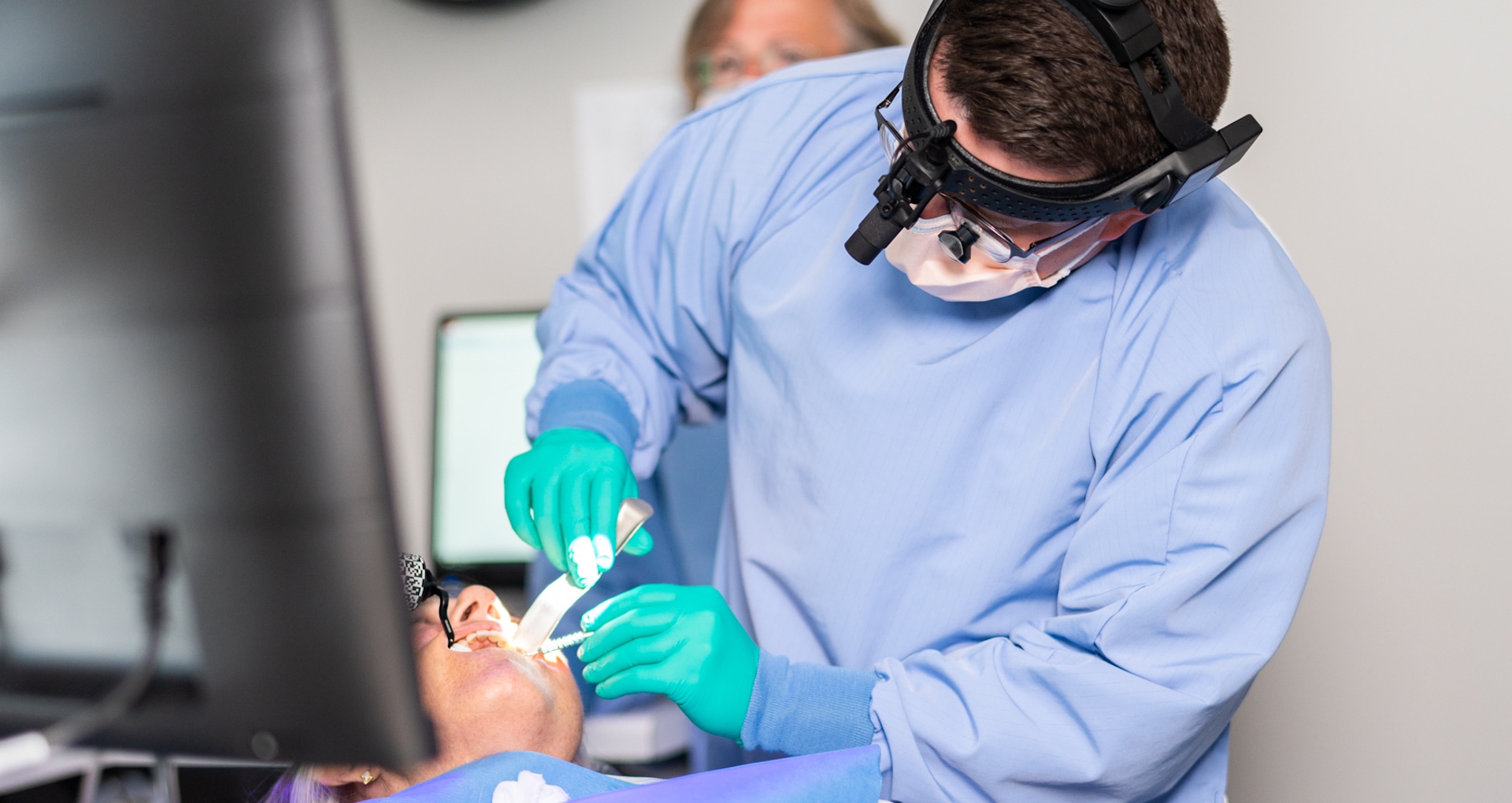Learn about
Treatment for Impacted Teeth
Impacted teeth can cause pain and swelling and may require extraction. In most cases, especially with impacted wisdom teeth, we do not have any control over how the teeth grow. Luckily, there are treatments available to address impacted teeth.
Advanced dentistry in a state-of-the-art surgical center.
Why Choose Legacy surgery
Dr. Kesecker is a Recognized Leader in Dental Implants, the All-on-4 Procedure, and Sedation Dentistry.
Expertise and Training: As a board certified oral and maxillofacial surgeon, Dr. Kesecker maintains certifications in Advanced Trauma Life Support, Advanced Cardiac Life Support, and Pediatric Advanced Life Support and can administer all types of anesthesia.
Experience: Dr. Kesecker has placed thousands of implants and has been delivering exquisite results for many years. Dr. Kesecker has completed advanced surgical training in the latest dental implant techniques.
State-of-the-Art Surgical Center: Our practice is designed to deliver exceptional patient care using the most advanced technology available.
We have 21st century technology now that can give you back your smile and ability to eat the foods you love – just like your natural teeth.
What is an impacted tooth?
A tooth is impacted when it is blocked from breaking through the gums. Some teeth are entirely impacted in the jaw bone, while some may be partially impacted and are only stuck under the gums or partially broken through the gums.
- What causes impacted teeth? Several things can cause teeth to become impacted. The most common cause is a lack of space in your mouth. Other causes include dental trauma, irregular tooth growth, extra teeth, and retained baby teeth.
- Which teeth are usually impacted? Any tooth can be impacted, but wisdom teeth and canines are the most common.
- Wisdom teeth: Also called your third molars, wisdom teeth are typically the last teeth to grow in and are also the most common teeth to become impacted.
- Canines: Particularly in the upper jaw, canines are the second most common teeth to become impacted.
What happens if wisdom teeth are impacted?
Some people do not have any symptoms associated with impacted teeth. Symptoms may also come and go over weeks or even months. Common signs and symptoms of impacted wisdom teeth include:
- Swollen, red gums
- Bad breath
- Difficulty opening or closing your mouth
- Pain when talking, chewing, or biting
How do you know if you have impacted wisdom teeth?
In addition to an exam, dental x-rays are done to determine if you have an impacted tooth. In fact, in many cases, an impacted tooth that is not causing any symptoms is only found during routine dental x-rays.
Impacted Teeth Treatment Options
For impacted teeth that are not causing any symptoms, your dentist may recommend monitoring the impacted teeth through routine dental check-ups. If they are causing symptoms, or your dentist recommends treatment, there are two types available.
- Impacted Tooth Removal: Extraction is common for wisdom teeth that are impacted. Since wisdom teeth are unnecessary and can cause problems, it is generally recommended to remove them when they become impacted. The extraction may be done using local or general anesthesia, usually depending on how impacted the teeth are. Your oral surgeon will make a small incision in your gum to extract the teeth. After the teeth are removed, stitches may be used to close the incision. The now-empty socket will be packed with gauze to control bleeding.
- Impacted Tooth Exposure Surgery: For impacted teeth
that are essential and should not be removed, such as canines, surgery is done to expose the crown of the impacted tooth and promote proper tooth eruption. Additionally, a bracket might be attached to the now-exposed tooth as a part of orthodontic treatment.
What happens if impacted teeth go untreated?
Choosing not to seek treatment for impacted teeth can potentially lead to serious dental problems.
- Tooth abscess: An impacted tooth that is infected can form an abscess if not treated. This happens when impacted teeth break through the gums, allowing bacteria to grow under the gums.
- Malocclusion (misalignment of teeth): When impacted teeth are not removed or allowed to erupt naturally, they can cause your teeth to become misaligned by pushing other teeth out of their natural space.
- Gingivitis or periodontal disease: Teeth that are partially impacted and have broken through the gums can lead to gingivitis. If untreated, periodontal disease is due to the difficulty in being able to clean these teeth properly.
Impacted Tooth Removal Cost
Dental insurance will usually cover some to all of the cost of treatment or removal of impacted teeth. Before any treatment, you will receive a breakdown of all the costs and what portion your insurance will cover, as well as what amount you may be responsible for.
Treatment for Impacted Teeth at Legacy Surgery
Dr. Kesecker and his team work to ensure a comfortable environment, and provide the best care possible to remove as much of the fear surrounding dental surgery. Contact us today if you believe you need treatment for impacted teeth.
